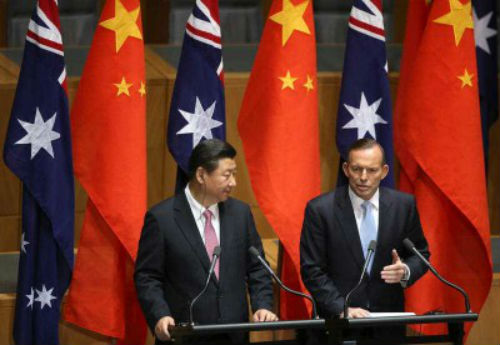Australia’s Abbott Reaches out to Jinping – Twice

Please note that we are not authorised to provide any investment advice. The content on this page is for information purposes only.
Forget shirt-fronting Russian President Vladimir Putin. Australian Prime Minister Tony Abbott’s most challenging task in the summit season was breaking an uncomfortable silence with Chinese president Xi Jinping. And he had to do it twice: first at the APEC meeting in Beijing and again at the G20 in Brisbane.
After vigorous lobbying by the US and Japan, Australia’s involvement in the China-led Asia Infrastructure Investment Bank was scuttled by the National Security Committee of federal cabinet on strategic grounds.
Forget shirt-fronting Russian President Vladimir Putin. Australian Prime Minister Tony Abbott’s most challenging task in the summit season was breaking an uncomfortable silence with Chinese president Xi Jinping. And he had to do it twice: first at the APEC meeting in Beijing and again at the G20 in Brisbane.
After vigorous lobbying by the US and Japan, Australia’s involvement in the China-led Asia Infrastructure Investment Bank was scuttled by the National Security Committee of federal cabinet on strategic grounds.
This does clarify the matter because trying to make sense of rejecting the proposal on the basis of economic reasoning is nigh on impossible. In 2011 the Asian Development Bank estimated Asia required US$750 billion each year through to 2020 to finance infrastructure needs. In 2012 the amount the ADB lent for infrastructure was justUS$7.5 billion. It is no surprise that among the government ministers it was Treasurer Joe Hockey and Trade Minister Andrew Robb who were keen on Australia joining the AIIB.
The decision to rebuff China’s invitation is awkward to say the least. Australia made reducing barriers to infrastructure investment a focal point of the G20 agenda. There is also the small matter of the memorandum of understanding the Australian and Chinese governments signed in 2012 on enhancing cooperation in infrastructure construction.
What then is the strategic test the AIIB failed?
The reason Abbott has repeated is the AIIB is a unilateral institution dominated by just one country. This means its lending decisions might be used by China to peddle its own interests. What Australia wants to join is an AIIB committed to being a multilateral institution along the lines of the ADB or the World Bank.
The AIIB is dominated by China. The 21 founding member countries agree the basic parameter determining the capital structure of the new bank will be relative GDP. Taken at face value, this would give China a 67.1 per cent shareholding, with the next in line being India at 13.3 per cent.
Of course the complaint the AIIB is a unilateral institution relies on painfully circular logic. If the US, Japan, Korea and Australia refuse to join, then any hopes of the AIIB becoming a multilateral institution are neutered. If these four countries were on board, China’s share would immediately fall to 24.5 per cent.
For its part, China not only invited Australia to participate but also offered the country a senior role in its running. China’s finance minister Lou Jiwei has made it clear he expects China’s shareholding will be diluted as other countries come on board.
It is also not hard to guess how China would take to being told that the World Bank and ADB are models of multilateralism. In 2010, after years of trying, the World Bank agreed to raise China’s voting share from 2.8 per cent to 4.2 per cent. This still left it trailing Japan on 6.8 per cent and the US on 15.8 per cent. Yet China’s GDP is already double that of Japan and its population is more than ten times larger.
Abbott’s argument that Australia should stay away from the AIIB because China may use it to advance its own nefarious purposes falls short on several counts.
China is already more than capable of pushing its own interests through existing institutions such as the China Development Bank. The idea it would sponsor a new institution and then invite countries such as Australia to become partners in crime fails any test of common sense.
Then there is the point made by the former Australian ambassador to China, Geoff Raby. That is, if transparency in lending decisions is a genuine concern, the most effective way of dealing with it is from the inside. Clearly this was the view taken by Singapore, a country that routinely ranks higher than Australia on international surveys of transparency and governance.
AIIB members all have very different broader strategic interests. Vietnam and the Philippines are engaged in heated territorial disputes with China in the South China Sea. Yet this did not stop them uniting for the common goal of improving regional infrastructure.
The only strategic end being served by not joining the AIIB is Australia supporting the US and Japan in their attempt to preserve the status quo in the Asia Pacific. The problem is the status quo ended in 1979 when China began its reintegration into the global economy.
Abbott’s awkward APEC moment is republished with permission from East Asia Forum




